-
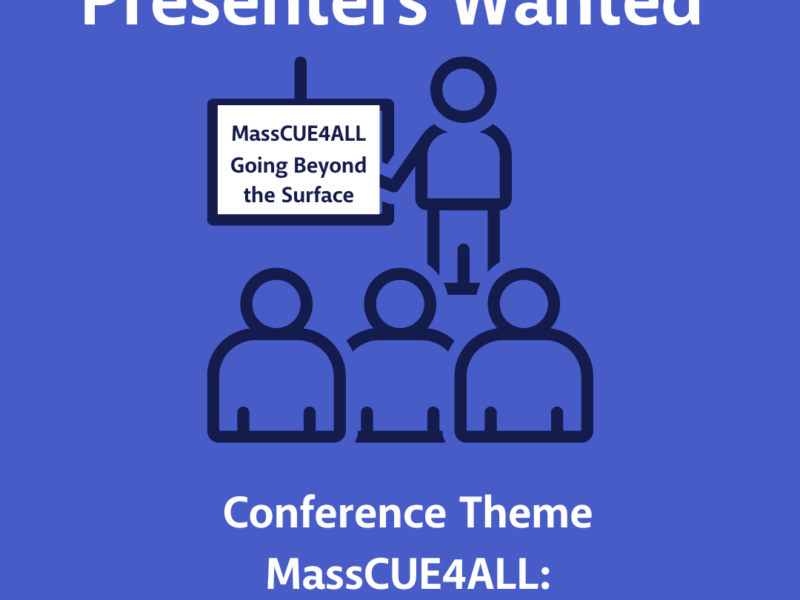
Call for Proposals: DEADLINE EXTENDED
Present at the MassCUE/M.A.S.S. Fall Conference 2024 Submit your proposal to present at the MassCUE/M.A.S.S. Fall Conference by July 19, 2024. This year's conference is set for October 16-17, 2024, at Gillette Stadium. The theme is MassCUE4ALL: Going Beyond the Surface. For more information on our theme, conference strands and opportunities to present, visit our Fall Conference 2024 event page. Deadline to submit extended to: July 19, 2024.
Continue reading -

Deadline Extended: 2024 Nominations for Administrator and Pathfinder Awards
Nominate a Colleague for a MassCUE Administrator or Pathfinder Award MassCUE is extending the deadline to nominate someone for an Administrator or Pathfinder Award. Do you know an exceptional educator who has made an impact in the field of educational technology? A current or former colleague who serves as a leader and an inspiration to others in their classroom, school or district? Nominate them for an Administrator or a Pathfinder award! Nominations are being accepted now for these awards, which are given out during the MassCUE Fall Conference in October. To submit a nomination, visit our Awards Committee page. Deadline to submit a nomination extended to July 31, 2024. The Administrator Award will be presented to a school or district leader who models and promotes the effective use of technology in their day-to-day execution of duties; provides exceptional leadership in supporting the integration of technology into the curriculum; and promotes, models, and establishes policies for safe, legal, and ethical use of digital information and technology. To submit a nomination, visit our Awards Committee page. K-12 school teachers, technology coordinators and other educators are eligible to be recognized with the Pathfinder Award, which will be given to an educator who facilitates a positive change in technological thinking in their classroom, school, or district; demonstrates vision and leadership; influences other educators and promotes ethical and responsible use of technology. To submit a nomination, visit our Awards Committee page. More Information See past winners and get more information on awards criteria and nomination procedures in the Awards & Recognition Committee section of our website.
Continue reading -
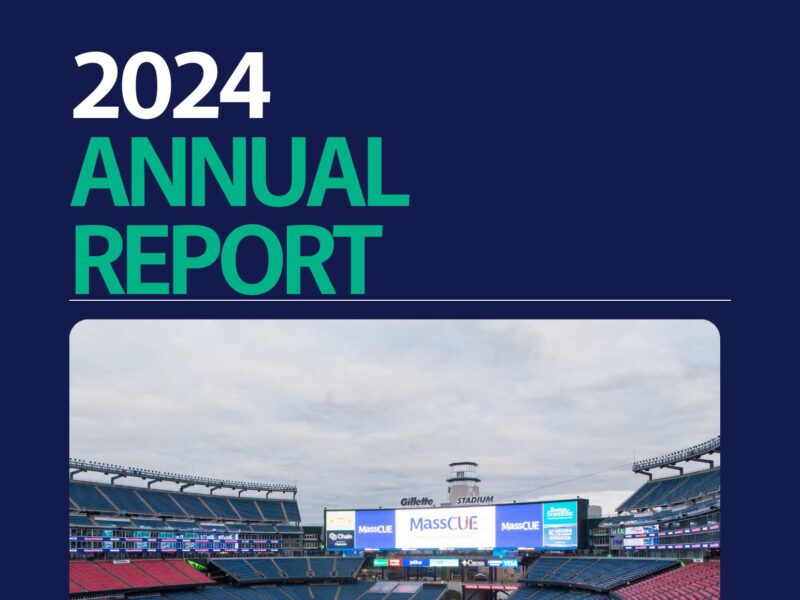
Annual Report 2024 Offers Highlights of the Year
The 2023-24 fiscal year saw MassCUE taking on new staff members, a new event management system and many new professional development opportunities, among other exciting changes. Read all about these accomplishments and more in our Annual Report. *Please note that the numbers at the end of the report are as of April 30, 2024. Up to date independent financial analysis will be added for fiscal year end, after July 1, 2024, and will be included in the report that is submitted to the state. Click on the image to view the report.
Continue reading -
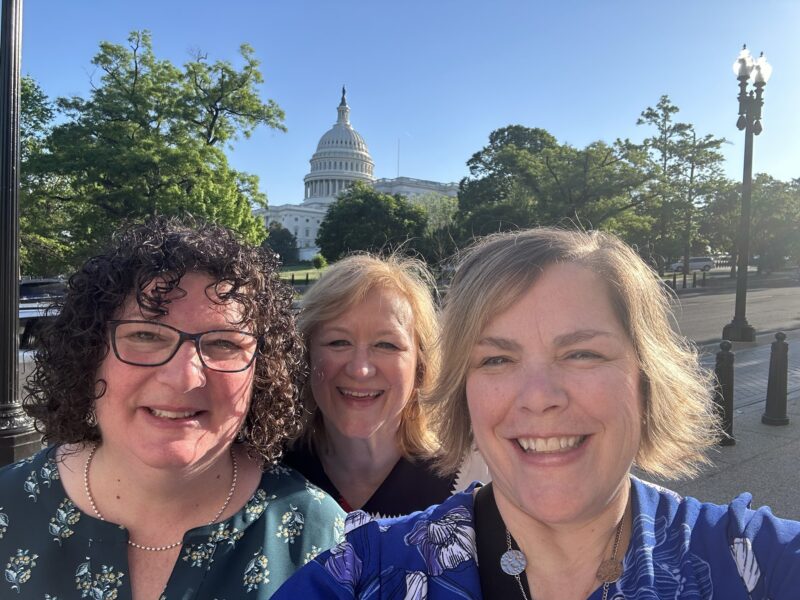
I&A Update: Ed Tech Advocacy and Policy Fly-In
June 2024 I&A Update: EdTech Advocacy Day On May 1, 2024, three members of our Influence and Advocacy Committee—Jenn Judkins, Colleen Terrill, and Karen Winsper—along with AJ Cote from DESE’s Office of Education Technology, took on the task of advocating for essential changes in educational technology. The team participated in the annual Ed Tech Advocacy and Policy Fly-In event, co-hosted by CoSN, ISTE, SETDA, and SIIA. This event brings together colleagues from various states, school districts, and ESAs, as well as members of Congress, key congressional staff, and education association leaders. They gathered in Washington DC to discuss critical topics such as cybersecurity, student data privacy, E-Rate, closing the homework gap, and other important educational technology issues. In the morning, the team joined leaders from the hosting organizations, other educators, vendors, and policymakers to prepare for the advocacy efforts. They met with staff from Representative Auchincloss’, Representative Trahan’s, and Representative McGovern’s offices as well as senior staff from Senator Warren’s and Senator Markey’s offices. The team emphasized the need for strong student data privacy measures, full funding for Title II and Title IV grants, enhanced cybersecurity, expanded E-Rate access including coverage for cybersecurity measures, and responsible AI usage. This year's event provided a unique opportunity to discuss how digital learning is a key element in creating equitable and effective education in a post-COVID world. The team's participation showcased the importance of collective action in achieving tangible progress toward ensuring every student has access to quality education in a digitally advanced setting. To learn more about key points from the event please click here. Visit the MassCUE Influence & Advocacy Committee page to learn more about our committee and how to get involved.
Continue reading -
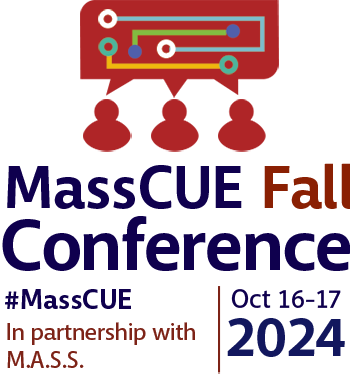
Call for Proposals Now Open
Present at the MassCUE/M.A.S.S. Fall Conference 2024 Our Request for Proposals (RFP) is now open for the MassCUE/M.A.S.S. Fall Conference which will be held at Gillette Stadium October 16-17, 2024. This year our conference theme is MassCUE4ALL: Going Beyond the Surface. For more information on our theme, conference strands and opportunities to present, visit our Fall Conference 2024 event page. Deadline to submit: July 12, 2024.
Continue reading -
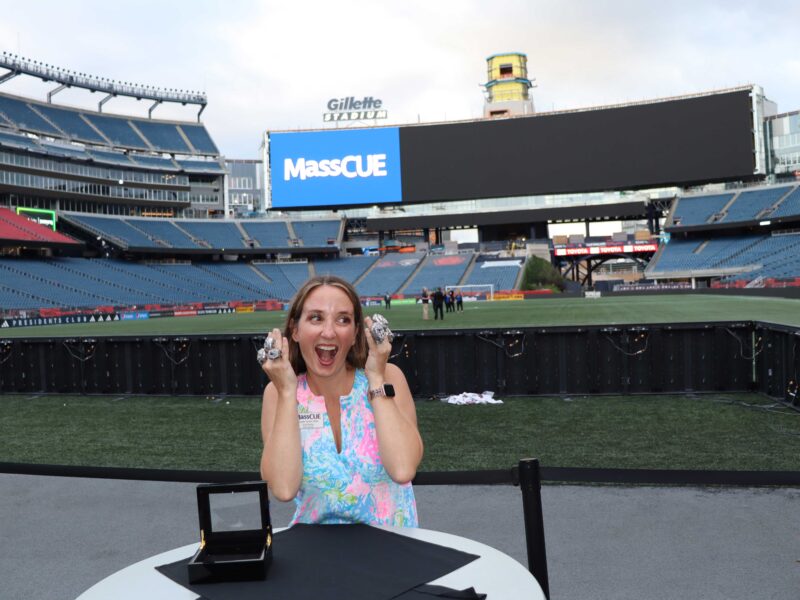
You are Invited: MassCUE Annual General Meeting 2024
MassCUE members, partners and supporters are invited to join us on June 5, 2024, for our Annual General Meeting. This event, which will be held at 5:00pm in the Optum Lounge at Gillette Stadium, is free for members and includes dinner and drinks. It’s a great opportunity to reconnect with old friends and make new connections with our Corporate Partners and other leaders in educational technology from around the commonwealth. Plus, the Optum Lounge offers easy access to the field for MassCUE selfies! Come get an update on past events and learn about some of the exciting things we have in store for this summer and the 2024-25 school year. To learn more or to register, please visit the Annual General Meeting event page on our website.
Continue reading -

New Membership Platform to Expand Membership Offerings
Get ready for new programming options and streamlined registration for courses and events from MassCUE! We are excited to announce that MassCUE will be moving to a new membership platform beginning May 1, 2024. The move to Wild Apricot will allow us to expand our offerings to members going forward. With this new platform, we will have the ability to expand programming, including more asynchronous PD offerings. The user-friendly interface will make registering for events and programs quick and easy, once you have entered your information. Starting May 1, all members will be asked to log in and create a Wild Apricot account. Watch your email for a link and instructions. Your information will be saved, reducing the amount of information you need to enter when registering for events or programs in the future! Emails will be sent to the address connected with your membership. This is just the first step in our plans to revitalize what we offer to our members. Your voice matters to us. That’s why we’ll also be forming a Membership Committee dedicated to gathering your input and suggestions. Stay tuned for more information on this new opportunity to help shape the future of MassCUE!
Continue reading -

Special Election for President-Elect, MassCUE Board of Directors
MassCUE 2024 Special Election Nominations Open May 20-May 27, 2024 MassCUE will hold a special election in May/June 2024…
Continue reading -
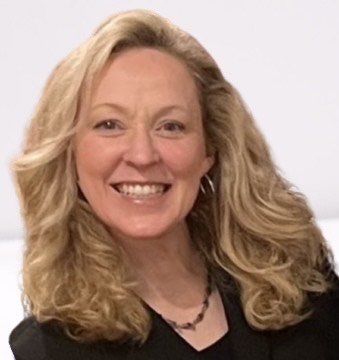
May Featured Educator – Kristina Ierardi
MassCUE is pleased to announce Kristina Ierardi as our Featured Educator for May 2024! Digital literacy skills empower students, promote critical thinking, bridge divides and prepare students for life in the digital age. That’s why Digital Literacy Teacher Kristina Ierardi is committed to staying ahead of technological advancements and sharing her love of learning and technology with her students. “Digital literacy is essential for preparing students for success in the digital age,” Ierardi says. “These skills empower them to be critical thinkers, responsible digital citizens and lifelong learners in an increasingly interconnected world.” Ierardi teaches digital literacy in grades 3-5 at Bourne Intermediate School in Bourne. She says she mixes lessons from the regular curriculum, focused on typing skills and the responsible use of technology, with What I Need (WIN) classes, which are focused on project-based learning. Examples of lessons in WIN classes include creating with AI in Padlet and other apps, developing stop motion in Google Slides and iMovie, learning HTML with Codemoji and binary code and creating ads in Canva, to name a few. She says digital literacy is important because technology is everywhere. “Being digitally literate is crucial for functioning effectively in many aspects of life, including education, work and personal tasks,” she says. “Teaching digital literacy encourages students to think critically about the information they encounter online. It equips students with the knowledge and skills to navigate the online world safely and responsibly.” Ierardi has a long list of favorite tools to use with classes. Some examples include Google (because it offers so much for free), Typing.com, Blooket, Kahoot, Piskel, Brush Ninja, Word Art and Storyboard That and Photos for Class. She says rapidly changing technology and the unpredictability of online resources can be a challenge of working with technology in education. “Sometimes I can plan a lesson, check it the night before, and then the day I deliver it, there’s been a change,” she says. Other challenges include monitoring students’ screen time to ensure they stay on task and addressing habits and managing apps that students are allowed to use at home, but not in school. When she’s not teaching students about safe and effective online navigation and communication, she’s offering training to her fellow educators. Ierardi offers weekly tech tips for faculty and staff, conducts trainings on various topics such as AI and provides one-on-one assistance on apps and devices. Her latest project is a podcast called Teaching is Hard. “This was an initiative to expand the reach of the professional development we offered in the district,” she says. “I work with the Elementary Curriculum Director, Lisa Dix, to produce weekly podcasts.” Her advice to others in similar roles: learn as much as you can and try to stay up to date or even ahead of the curve. Ierardi says the best way to do that is to attend conferences, do research on YouTube, join online forums and tune in to social media conversations. A couple of her favorite edtech experts are Alice Keeler and Eric Curts. Another great way to stay current on the latest in edtech is to join an organization like MassCUE to connect with others like her. “I find a lot of schools don’t have a dedicated Digital Literacy Teacher, so I’d love to meet you." Kristina Ierardi is a dedicated educator with a passion for integrating technology into the classroom to enhance student learning experiences. She holds a Massachusetts Professional Teaching License in Information Technology for K-12 education, a Master’s Degree in Higher Education Administration from Boston College and a Graduate Certificate in Instructional Technology from Framingham State University. She has been an educator serving Massachusetts public school students for over 30 years. Currently she teaches Digital Literacy and serves as an Instructional Technology Specialist at Bourne Public Schools. She possesses the expertise to effectively teach and incorporate technological tools into the curriculum. She integrates AI, iMovie, Canva, Sphero Robots, stop motion, animation, and many other applications and tools into teaching students to responsibly use and communicate with digital devices. She is a Google Certified Educator (Level 1 and 2) and a Certified Educator for Clever’s Enhanced Teacher Portal. Her background also includes web development with HTML, JavaScript and game development with GameSalad. She is proficient in using and teaching both Google Workspace apps and Microsoft Office programs. Her background in higher education includes serving as a Teaching and Learning Center Mentor, Academic Advisor, admissions recruiter, adjunct faculty member, Professional Development Co-Chair, and the Coordinator of Career Services and Experiential Learning at Cape Cod Community College. She has effectively utilized and instructed on Learning Management Systems (LMS), including Moodle, Blackboard, and Canvas. She is also skilled in using and teaching PowerSchool, Jenzabar, and other student databases and applications. Kristina is committed to utilizing innovative educational platforms to create engaging and dynamic learning environments. She recently co-presented at the MassCUE conference on GAME ON! Free Online Tools to Create Winning Learning Activities. She also presents on LinkedIn and other career development tools. Her latest project is co-hosting and producing the Teaching is Hard podcast on Podbean.
Continue reading -

2024 Nominations for Administrator and Pathfinder Awards
Nominate a Colleague for a MassCUE Administrator or Pathfinder Award Do you know an exceptional educator who has made an impact in the field of educational technology? A current or former colleague who serves as a leader and an inspiration to others in their classroom, school or district? Nominate them for an Administrator or a Pathfinder award! Nominations are being accepted now for these awards, which are given out during the MassCUE Fall Conference in October. To submit a nomination, visit our Awards Committee page. Deadline to submit a nomination extended to July 31, 2024. The Administrator Award will be presented to a school or district leader who models and promotes the effective use of technology in their day-to-day execution of duties; provides exceptional leadership in supporting the integration of technology into the curriculum; and promotes, models, and establishes policies for safe, legal, and ethical use of digital information and technology. To submit a nomination, visit our Awards Committee page. K-12 school teachers, technology coordinators and other educators are eligible to be recognized with the Pathfinder Award, which will be given to an educator who facilitates a positive change in technological thinking in their classroom, school, or district; demonstrates vision and leadership; influences other educators and promotes ethical and responsible use of technology. To submit a nomination, visit our Awards Committee page. More Information See past winners and get more information on awards criteria and nomination procedures in the Awards & Recognition Committee section of our website.
Continue reading -

I&A Update: Tools to Develop a School Safety Plan
May 2024 I&A Update: Tools to Develop a School Safety Plan For those who aren’t aware, the Cybersecurity and…
Continue reading -
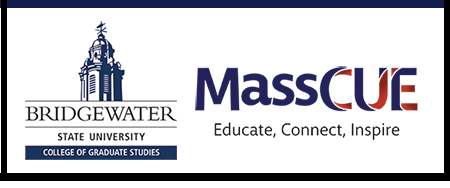
BSU Instructional Technology Information Sessions 4/23, 4/30 or 5/9
Bridgewater State University Graduate Credit Information Sessions Interested in pursuing a certificate or license as…
Continue reading -

2024 MassCUE Election – Board Welcomes Newly Elected Members
MassCUE Board of Directors 2024 Election Results MassCUE is pleased to announce the results of our April 2024 election. Two veteran members will continue their service with MassCUE, along with two new members for the 2024-2026 term. We would like to congratulate and welcome the following educators, who were elected by our members in voting that took place April 8-12, 2024. This group of professionals brings a wealth of experience, skills and expertise to MassCUE’s mission to educate, connect and inspire educators across the commonwealth. To learn more about our new members, visit the Board of Directors section of our website and click on the Board Members tab.
Continue reading -
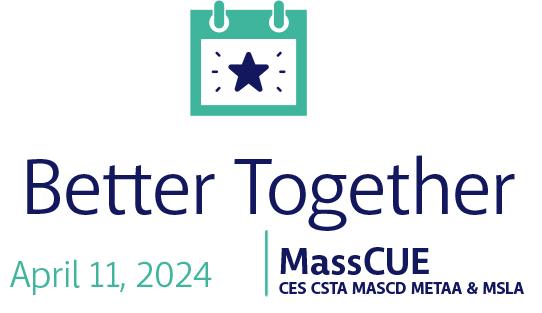
Recording Available – Better Together: “AI” Virtual Panel Discussion
Watch the Recording AI: Impact on Education How can AI help and how can it impede learning? Does the…
Continue reading
